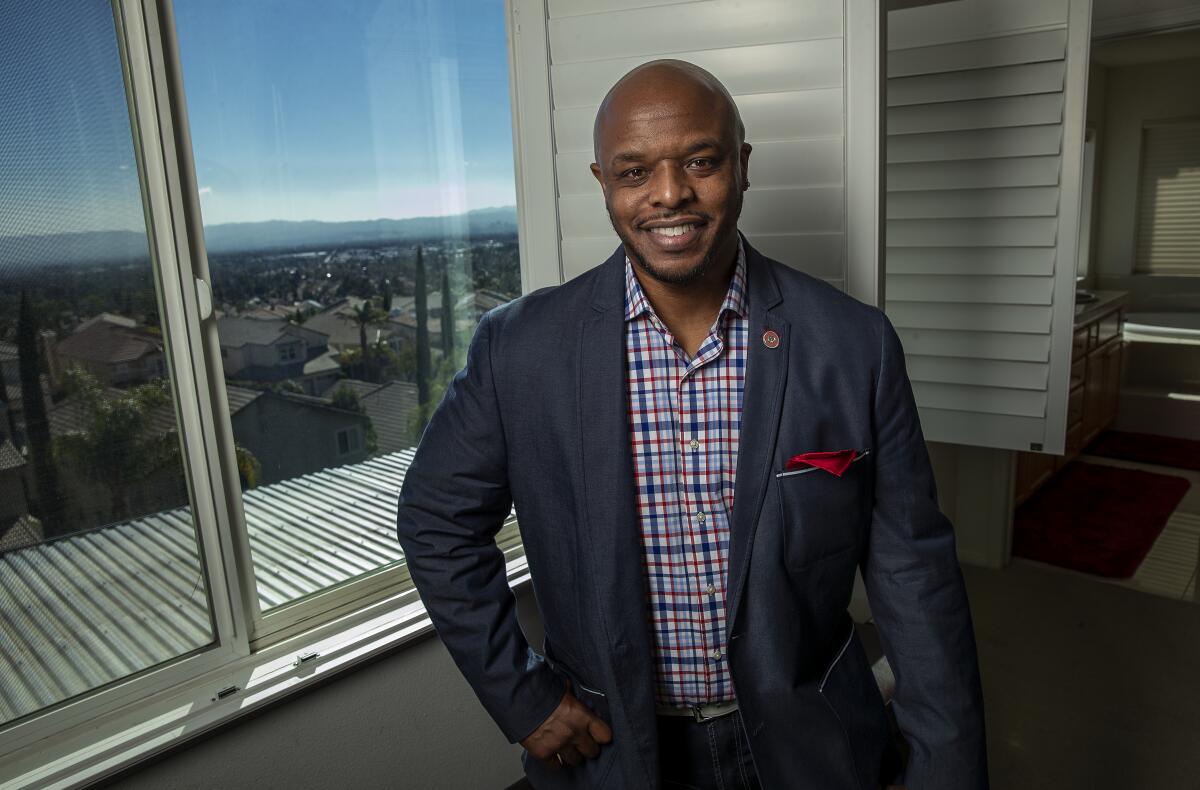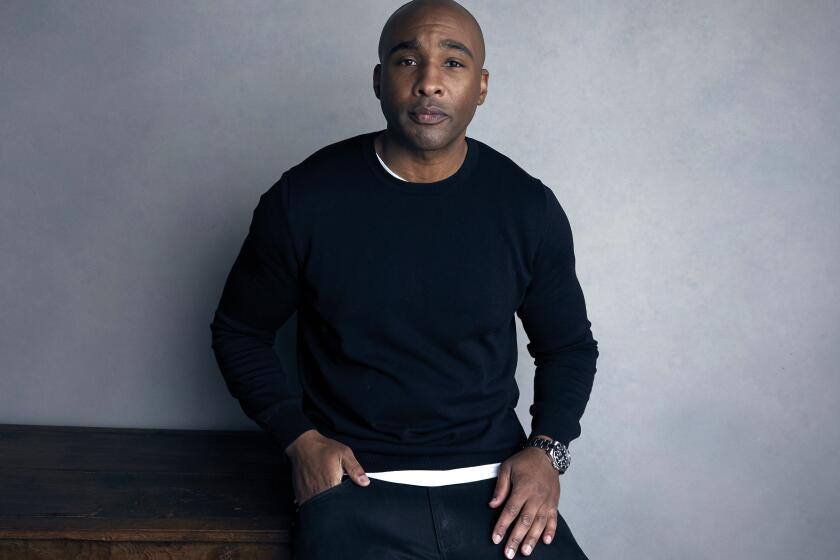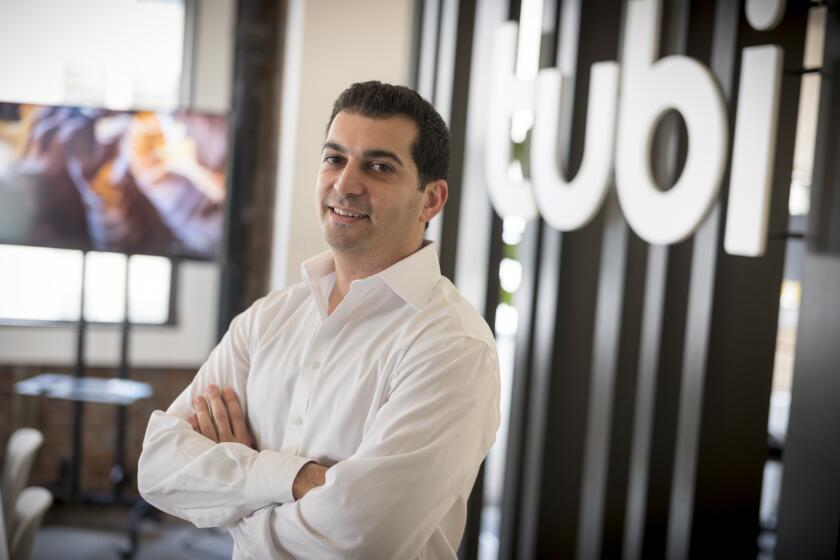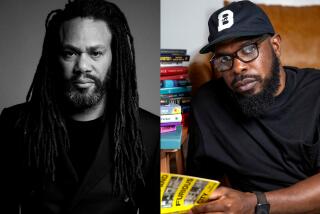ALLBLK was the first streamer to feature Black creators. Now it’s launching a talk show

Nnegest Likké was confident her romantic comedy, “Everything But a Man” would spark a bidding war among Hollywood studios. After all, it starred Monica Calhoun from “The Best Man” franchise and won film festival awards. She believed the love story of a Haitian handyman and Black American lawyer would resonate with Black audiences worldwide. But major studio executives disagreed.
“Every studio I went to said, ‘we don’t get it,’” Likké said, who shopped her film from 2017 to 2019. “I heard, ‘it’s too Black’ and ‘we don’t know how to market this.’”
The film would have been shelved if it didn’t find a home at ALLBLK, an AMC Networks streaming service that promotes series and films that feature Black talent. The platform declined to reveal figures but said it saw exponential growth during the pandemic, with its subscriber base increasing 150% as the nation deepened its conversations about race and social justice.
San Francisco-based mobile research firm Sensor Tower estimates ALLBLK’s mobile app has had 1.3 million installs in the U.S. to date, adding 669,000 installs last year, up 230% from 2019.
Its popularity surge caused ALLBLK to expand into other areas of content. Later this month, the streamer plans to launch its first weekly talk show, “Social Society” anchored by influencer Kendall Kyndall, who acts in BET drama “Games People Play.”
It is among 15 original series that will premiere on ALLBLK this year, including eight new original programs. Last year, the company launched 10 original series premieres with seven new original programs. The first film slate is targeted for 2023.
When it launched in 2014 (it was originally known as Urban Movie Channel), ALLBLK was widely recognized as the first streamer for Black TV and film. Since then other services have popped up targeting the same audience, including BET’s streaming service BET+, kweliTV, Brown Sugar and Blacktag, which works with Black influencers.
Profile of Blacktag, a new streaming service backed by CAA and other investors featuring content from Black creators.
Brett Dismuke, ALLBLK’s general manager, believes the platform’s original series set it apart.
The service, which charges about $5 a month, has 1,000 hours of film and TV shows and releases new content each week. Original productions, which include programs such as reality shows and scripted series, make up roughly 35% to 40% of its library.
“Netflix, Hulu, Amazon — those services have Black content, but it’s not a focus,” said Dismuke, adding that the average niche program doesn’t get promoted and the onus is often on consumers to find those titles. “Our platform is curated specifically for our audience, stories that are being told by and acted out by people of color... Quite frankly, we are showcasing shows that probably would not have been greenlit by a major studio or by a major network whether it was broadcast or cable.”
Likké’s film, “Everything But a Man,” which cost a little more than $1 million to make, is an example of a project rejected by studios that thrived on ALLBLK when it was released in June. ALLBLK obtained an exclusive streaming license for the film.
“When I got the call, and they said ‘your film was number one debut in the history of the platform,’ I said, ‘Hallelujah, thank you Jesus,’ ” Likké said. “Obviously, it was sweet because the film had found its perfect home and it was bitter only because we had been through rejection for a film that has such a huge market.”
A review of senior leadership at the six major media companies shows that the top ranks remain overwhelmingly white.
ALLBLK is tapping into a demand for content from Black audiences that are underserved by Hollywood, analysts said.
In the past, major media companies tended to focus on the general population versus specific ethnic segments. Streaming has opened the door to targeted, niche services — because the cost of launching such a service is generally cheaper than a cable network.
“Black consumers — they actually over-index on the consumption of video relative to other ethnicities,” said Mike Chapman, a partner at management consulting firm Kearney.
“ALLBLK is taking advantage of a unique market opportunity to serve an underserved community of viewers, which is the African American community,” Chapman added. “When you look at the broad array of options for Black produced content, they’re very limited in today’s marketplace and there is a hunger from consumers to actually see more of this type of content.”
Dismuke says that 86% of ALLBLK subscribers are African American females, between the ages of 25 and 54. The company has seen rapid growth from the 18 to 34 demographic, which is part of the reason why ALLBLK is launching some shows like “Social Society.”
“Social Society” will open with a comedy sketch followed by a discussion on a different theme each episode, including Black entrepreneurship, Black love and financial literacy led by influencer Kyndall and a rotating female guest co-host. Episodes will feature commentary from influencers, lifestyle experts and tastemakers.
“It’s definitely a platform for Blacks where we can come and have a voice,” Kyndall said. “We’re definitely not going to be afraid to talk about race and especially what we saw that was happening in 2020.”
Dismuke described the show as taking the best elements of sketch comedy series like “In Living Color” and news commentary seen in “Last Week Tonight with John Oliver.”
“The reason why we’re doing this show in the first place is to give voice to a community and people that traditionally feel like, no one hears us, but ourselves,” Dismuke said.
Other shows on ALLBLK include reality program “Beyond the Pole,” about Georgia strippers’ transition out of the industry; “A House Divided” a scripted drama about a wealthy L.A. Black family’s drama; and “Monogamy,” a series about four married Black couples who sign up for a mysterious experiment to fix their problems.
“This is content that you cannot see anywhere else and we really take pride in the fact that we don’t have shows that are just a regurgitation of something else that you would see on BET+ or Brown Sugar,” Dismuke said. “If the storyline is close to a show on one of those other networks, that’s an automatic pass for us.”
ALLBLK is part of AMC Networks’ strategy in super-serving niche audiences who are passionate about certain types of content — whether it be Black shows and films or horror fans in the case of its streaming service Shudder. The streaming service business is a bright spot, as AMC Networks and other cable companies grapple with more people cutting the cord.
“There is an opportunity for services like the ones that we have to provide a different experience than the more general services like Netflix, Amazon, Hulu and others,” said Miguel Penella, president of AMC Networks SVOD (subscription video on demand). He added that the library of curated content provides “a distinct and differentiated destination where people go to the service and they feel like everything there is for them — the content but also the voice.”
Within AMC Networks, there are about 50 to 60 people who are part of the ALLBLK team, with half located in the streamer’s offices in the L.A. area, in Woodland Hills and Santa Monica (others work out of offices in Maryland and Manhattan, where AMC is based).
The team is primarily comprised of women who identify as Black, Dismuke said.
ALLBLK’s content resonates with viewers. For example, the level of engagement on “Monogamy” based on consumer surveys and what viewers share on social media, is much higher compared to other shows in its genre featuring Black casts such as Netflix’s drama “Blood & Water,” said Carol Hanley, chief revenue and strategy officer with Whip Media.
“The Black audience tends to be very loyal and have a very high engagement,” Hanley said. “It’s all about the ability to target and it’s really simply that these people are very consciously choosing to watch this program and find this network.”
ALLBLK bills itself as “a streaming entertainment experience that’s inclusively, but unapologetically — Black.” It was created by BET founder Robert Johnson under his company, RLJ Entertainment in 2014. He was inspired to launch his own streaming service for Black audiences after seeing the success of niche streaming service Acorn TV, which focuses on British programs, Penella said. AMC Networks acquired RLJ Entertainment, which owned Acorn and Urban Movie Channel in a transaction worth $274 million.
As the mega-corporations swoop in, smaller streaming services such as Tubi, Pluto TV and Crunchyroll find a way to compete.
UMC changed its name in January to ALLBLK.
Although AMC Networks does not break out subscriber numbers, the company said it expects the total number of subscribers across six streaming services including ALLBLK to be 5 million to 5.5 million in 2020. That total is much lower than Netflix’s more than 200 million subscribers.
Consumers can access ALLBLK through its app and website, a WE tv+ bundle, as well as subscribe through platforms such as Roku and Amazon Fire.
Despite the rising competition, Dismuke is confident ALLBLK can thrive.
“More so than just offering a variety of content, these networks and these streaming services are pushing each other to be better and bigger, so I think it can only have a positive impact,” Dismuke said.
More to Read
Inside the business of entertainment
The Wide Shot brings you news, analysis and insights on everything from streaming wars to production — and what it all means for the future.
You may occasionally receive promotional content from the Los Angeles Times.













